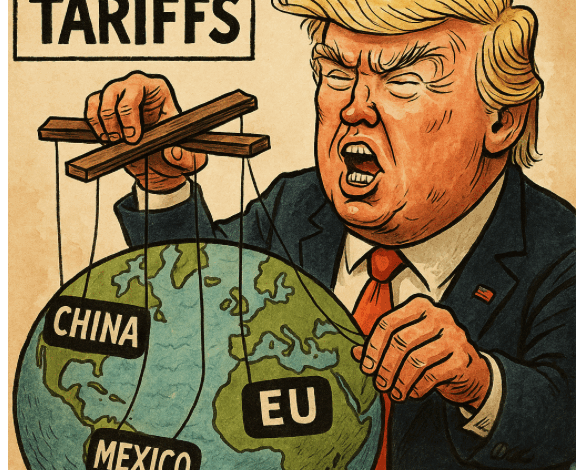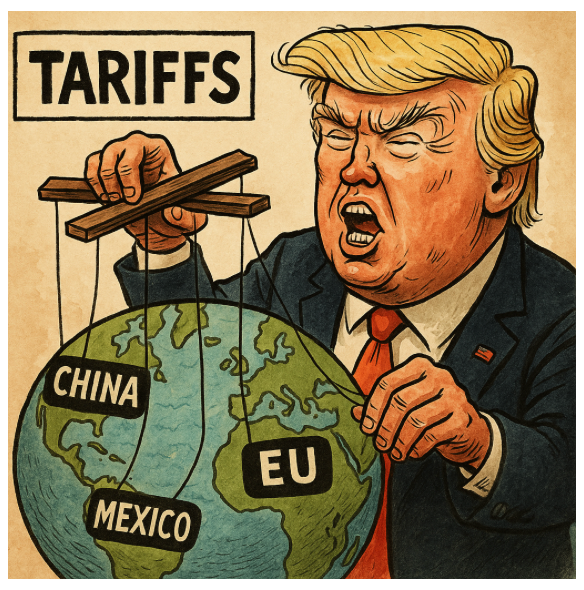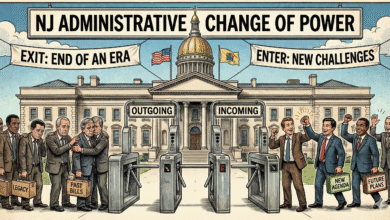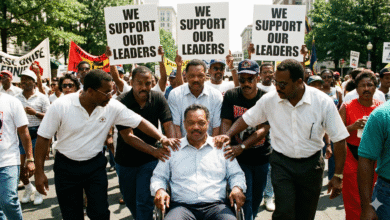
Tariffs, Trade, and the Black Bottom Line: How Trump’s Economic Policies Hit Northern New Jersey
During his presidency, Donald Trump imposed sweeping tariffs on imported goods — particularly from China — as part of his “America First” trade agenda. While framed as a move to protect U.S. industries, these tariffs had ripple effects across regional economies, including in Northern New Jersey, where a diverse network of small businesses, importers, and manufacturers felt the squeeze. As the policies shifted again under the Biden administration, the unwinding of tariffs made some investors and firms significant profits, while leaving others, particularly in Black communities, playing catch-up.
Local Impact: How Tariffs Hit Northern NJ
Northern New Jersey’s economy depends heavily on international trade, port logistics, small manufacturing, and wholesale supply chains — all sectors directly affected by tariff policy.
1. Port and Logistics Industries (Essex, Hudson, Union Counties)
The Port of Newark and Elizabeth — one of the busiest on the East Coast — saw rising costs and shipping slowdowns due to tariff wars and retaliatory fees from foreign nations. Importers paid steep tariffs on machinery, consumer goods, and building materials, forcing local distributors and retailers to pass higher prices on to consumers.
2. Apparel and Textile Businesses (Paterson, Jersey City, Newark)
Tariffs on imported fabric, dyes, and equipment hurt small fashion and textile businesses — particularly immigrant and Black-owned companies. Many lacked the financial cushion to absorb cost hikes, resulting in layoffs, closures, or reduced operations.
3. Automotive and Electronics Markets (Bergen, Morris Counties)
High tariffs on Chinese electronics and auto parts disrupted supply chains and raised repair costs. Mechanics, IT firms, and aftermarket auto sellers were affected by long delays and inflationary prices.
4. Construction and Real Estate Development
Tariffs on steel, aluminum, and lumber drove up the cost of commercial and residential construction projects across urban centers like Newark, Elizabeth, and Passaic. This slowed development and added pressure to an already-tight housing market.
Who Benefited When Tariffs Were Removed?
When some tariffs were eased or removed under the Biden administration, private equity firms, global investors, and large importers who stockpiled goods during the tariff era saw major gains:
- Big wholesalers who had purchased goods pre-tariff rollback saw price jumps that translated into windfall profits when they sold inventory post-removal.
- Hedge funds that speculated on commodities (like steel and copper) benefited from sharp price swings.
- Retail giants with diversified supply chains gained competitive advantages over local businesses still recovering from 2020–2022 losses.
In essence, those with capital and foresight profited, while small operators — many from communities of color — struggled to keep up.
How African American Communities Were Affected
Black-owned businesses in Northern New Jersey — already undercapitalized and underinsured — were disproportionately affected by:
- Higher overhead costs (goods, transport, equipment)
- Decreased customer traffic due to rising prices and inflation
- Lack of access to low-interest loans to navigate cost volatility
At the community level:
- Employment in warehousing, trucking, and retail was impacted by slowed trade and supply constraints.
- Renters and first-time homebuyers faced climbing construction and renovation costs, deepening the racial wealth gap.
How to Protect Yourself from Economic Volatility
Even without another tariff crisis, Black communities and small business owners can take action to insulate themselves from future economic shocks:
1. Diversify Supply Chains
Source materials or goods from multiple regions (including domestic suppliers) to reduce reliance on any one country or policy outcome.
2. Invest in Financial Literacy and Asset Protection
Programs like Operation HOPE, Urban League, or local credit unions offer education on budgeting, investing, and insurance planning.
3. Leverage Cooperative Buying Power
Join business alliances or purchasing co-ops that allow members to negotiate better bulk rates for goods and materials.
4. Build Relationships with Local Policy Advocates
Support or connect with organizations that advocate for equitable small business aid, minority procurement access, and infrastructure investment.
5. Track Trade Policy News
Stay informed on trade policy through reliable news sources and government updates to better anticipate how policies may affect your business.
Final Word: Policy Trickles Down, But Not Equally
Tariffs may be federal policies, but their impacts are deeply local. In Northern New Jersey, President Trump’s trade wars reshaped industries, inflated costs, and deepened structural inequities. As policies evolve, it’s critical that Black communities and business owners have the tools, access, and collective strategies to not just survive — but to build and thrive.
HfYC will continue to track local economic trends and provide accessible guides to help you navigate them. Stay tuned for upcoming stories on financial tools, business growth strategies, and local economic justice campaigns.






